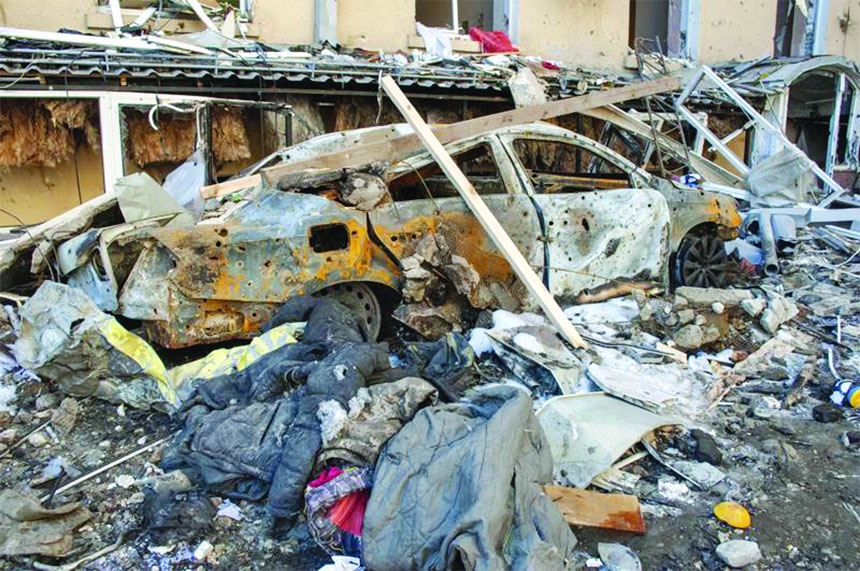
AP :
One month of war, still defiant. With its government still standing and its outnumbered troops battling Russian forces to bloody stalemates in multiple places, Ukraine is scarred, wounded, mourning its dead but far from beaten as it braces for a second month of bombing, combat, casualties and resistance.
When, on Feb. 24, Russia unleashed its Ukraine invasion force in Europe’s biggest offensive since World War II and brandished the prospect of nuclear escalation if the West intervened, a lightning-swift toppling of Ukraine’s democratically elected government seemed possible.
But with Wednesday marking four full weeks of fighting, Russia is instead bogged down in an increasingly costly, uncertain and grinding military campaign, with untold numbers of dead, no immediate end in sight, and encircled by western sanctions biting hard on its economy and currency. US President Joe Biden and key allies meeting in Brussels and Warsaw this week will discuss possible new sanctions and additional military assistance for Ukraine.
The economic and geopolitical shockwaves – with soaring energy prices, fears for global food supplies, and Russia and China aligning in a new world order with echoes of the Cold War – have reverberated across the planet that still hasn’t emerged from the ongoing crisis of the coronavirus pandemic.
With his military-olive tops, rugged and resolute look and impassioned appeals to governments across the world for help, Ukrainian President Volodymyr Zelenskyy has been transformed into a wartime communicator and No. 1 thorn on the side of Russian President Vladimir Putin. Addressing Japan’s parliament on Wednesday, Zelenskyy said four weeks of war have killed thousands of people and 121 of Ukraine’s children.
“Our people cannot even adequately bury their murdered relatives, friends and neighbors, they have to be buried right in the yards of destroyed buildings, next to the roads,” he said.
Repeatedly pushed back by hit-and-run Ukrainian units armed with Western-supplied weapons, Russian troops are shelling targets from afar, falling back on tactics they previously used in reducing cities to ruins in Syria and Chechnya. Major Russian strategic objectives remain unfulfilled: The capital Kyiv has been repeatedly hit but not taken or even encircled.
More shelling and gunfire shook the city again Wednesday, with plumes of black smoke
rising from the western outskirts, where the two sides battled for control of multiple suburbs. A shopping mall and buildings were hit, injuring four people, the city administration reported.
In the south, the port city of Mariupol has seen the worst devastation of the war, under weeks of siege and bombardment. So far, the Ukrainian forces’ defense has prevented its fall. That is thwarting the Russian aim of opening up another permanent and secured land link from the Crimean peninsula, seized from Ukraine in 2014, to Russia.
Zelenskyy says 100,000 civilians remain in the city, which had a pre-war population of 430,000 and has been shattered by strikes from air, land and sea. Repeated efforts to get desperately needed food and other supplies to those trapped have often failed. “They bombed us for the past 20 days,” said 39-year-old Viktoria Totsen, who fled from Mariupol into Poland. “During the last five days, the planes were flying over us every five seconds and dropped bombs everywhere – on residential buildings, kindergartens, art schools, everywhere.”
Zelenskyy, speaking Tuesday in his nightly video address to his nation, said efforts to establish stable humanitarian corridors for Mariupol residents are almost all being “foiled by the Russian occupiers, by shelling or deliberate terror.”
He accused Russian forces of seizing one humanitarian convoy. Deputy Prime Minister Iryna Vereshchuk said the Russians were holding captive 11 bus drivers and four rescue workers along with their vehicles.
The head of the International Committee of the Red Cross traveled Wednesday to Moscow for expected discussions with Russian foreign and defense officials on prisoners of war, the conduct of hostilities, aid delivery and other humanitarian issues.
“The devastation caused by the conflict in recent weeks, as well as eight years of conflict in Donbas, has been vast,” Peter Maurer, the ICRC president, said.
A senior US defense official, speaking on condition of anonymity to give the Pentagon’s assessment, said Russian ships in the Sea of Azov added to the shelling of Mariupol.
The hands of one exhausted Mariupol survivor shook as she arrived by train in the western city of Lviv.
“There’s no connection with the world. We couldn’t ask for help,” said Julia Krytska, who was helped by volunteers to make it out with her husband and son. “People don’t even have water there.”

